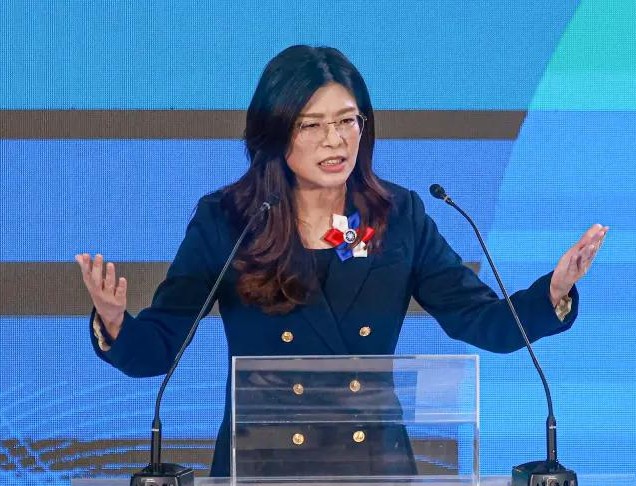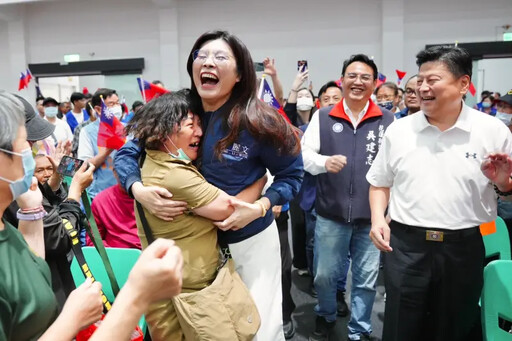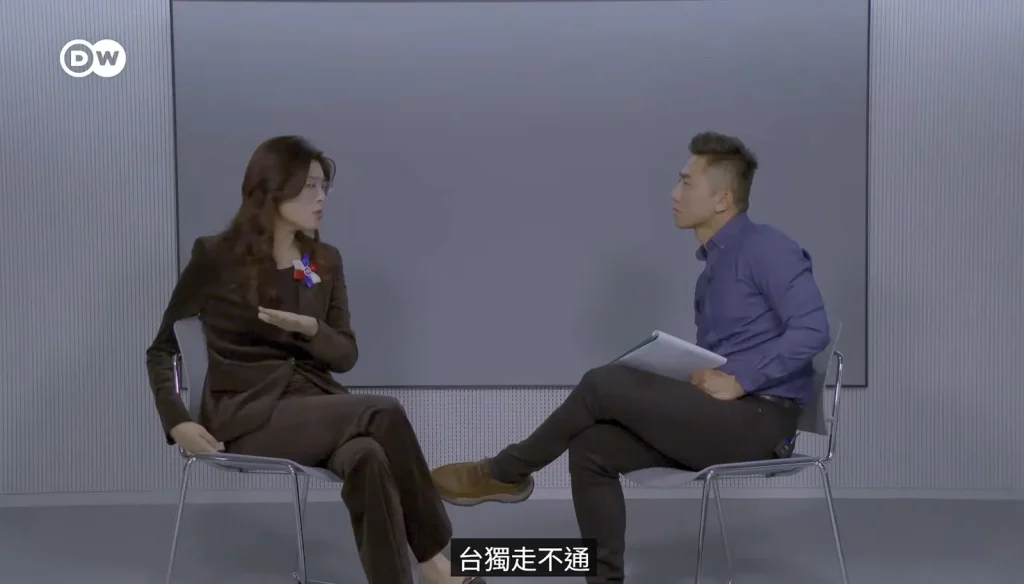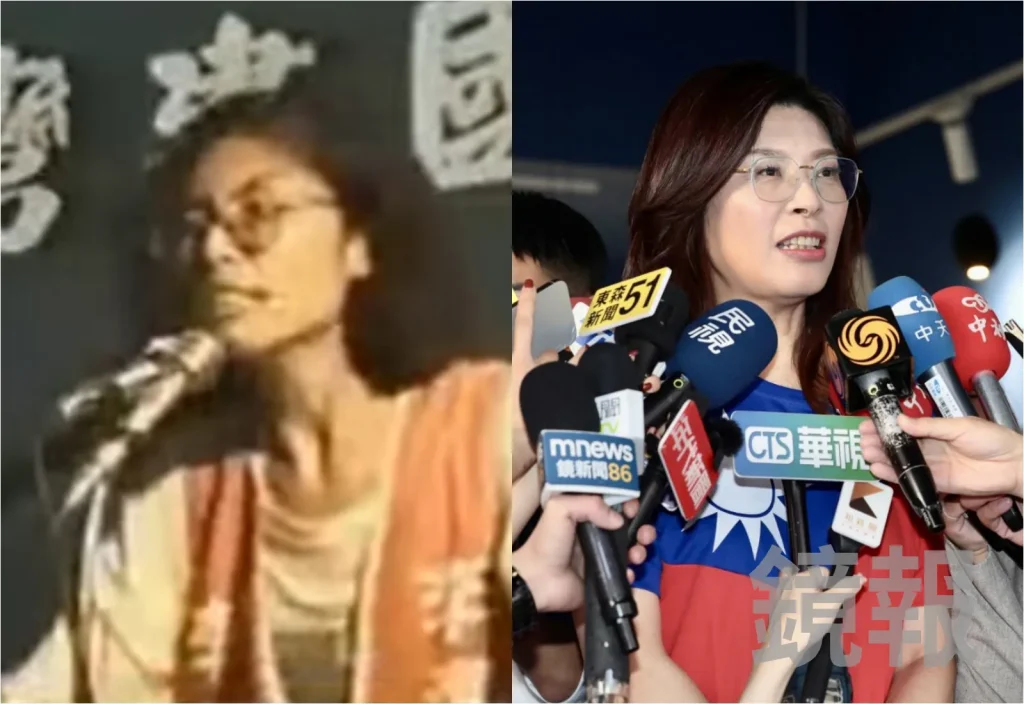By Yu-Jhou (Jonathan) Chen, Kaohsiung American School, Grade 11.
Image via Mirror Media shows two pictures of Cheng Li-wun. On the left, Cheng, earlier in her career, during which time she expressed pro-independence views and criticized the KMT. And right: Cheng in 2025, following a win as the KMT’s new chair. (Photo: Mirror Media / Lin Wei-kai)
When I first heard that the Kuomintang (KMT) had elected a new chairperson, I honestly didn’t expect it to matter much to people my age. But the more I learned about the election and what it represents, the more I realized it reveals something about where Taiwan’s democracy is heading—and what kind of future my generation may inherit.
Before getting into personalities and politics, it’s important to understand what the KMT chairperson actually does. The role is one of the most influential inside the party: shaping candidate nominations, guiding strategy, managing finances, and serving as the voice of the opposition in major national debates. The chair also helps define the party’s position on cross-strait issues and often sets the tone for interactions with the Democratic Progressive Party (DPP). Whoever takes the job can influence not just the KMT’s direction, but Taiwan’s broader political atmosphere.

On October 18, 2025, the KMT elected its new chair after a six-way contest. Cheng Li-wun (鄭麗文) won just over half the votes. She defeated candidates including former Taipei Mayor Hau Lung-bin (郝龍斌) and legislator Lo Chih-Chiang (羅智強). Turnout was about 39 percent—lower than ideal, but enough to give Cheng a clear win.
When she assumed office on November 1, she became the first KMT chairperson to have previously been a member of the DPP, Taiwan’s ruling party. She also became only the second female chair in KMT history, following Hung Hsiu-Chu (洪秀柱). Cheng is no doubt hoping for a better fate than Hung, whose 15-month tenure (March 2016–June 2017) was one of the shorter modern KMT chairmanships.

Cheng’s election signals a mix of continuity and change: she speaks about modernization but also emphasizes themes long associated with the KMT’s traditional values. Although she frames herself as a reformer, her past public positions and speeches place her clearly within the party’s deep-blue ideological camp.
Like Hung Hsiu-Chu, Cheng is widely viewed as part of the KMT’s deep-blue faction, which stresses cultural connections with China and supports dialogue aimed at long-term cross-strait stability. She has publicly said she hopes Taiwanese feel “Proud to be Chinese,” and during a televised debate, she stated that “Taiwan and the mainland should join forces to reach new heights in human civilization.”
Supporters interpret these comments as an effort to promote communication and reduce tensions. Critics argue that some of her phrasing resembles narratives preferred by Beijing. According to Reuters on November 1, Cheng urged the KMT to improve dialogue with China and warned that miscommunication could increase the risk of conflict. The Taipei Times also reported that former KMT legislator Apollo Chen (陳學聖) expressed concern that voters might perceive the party as leaning toward rapid unification.

Her political style blends nationalist language with elements of pragmatism, though people differ on how consistently the two fit together. Older voters may find this approach familiar or reassuring. Younger voters—especially those who identify strongly with Taiwan’s democracy—often respond differently. Voting patterns and youth surveys over the past few elections suggest that the KMT has struggled to connect with people under 30.
The party Cheng inherits faces real challenges. Once dominant, the KMT has lost several national elections in a row. A recent wave of recall efforts targeting dozens of KMT legislators highlighted the passion and polarization running through Taiwan’s politics today.
Cheng herself is not new to politics. Her career spans nearly 30 years and multiple branches of government. Her first political experience was during the 1990 Wild Lily student movement, which pushed for democratic reforms when Taiwan was still transitioning away from authoritarian rule. She later joined the DPP in the mid-1990s and served in the National Assembly from 1996 to 2000 before its powers were transferred to the Legislative Yuan.
By the early 2000s, she said she had grown frustrated with what she called the DPP’s “ideological rigidity.” In 2005, she joined the KMT during a period when several politicians shifted from the green camp to the blue camp under the Chen Shui-bian administration.
Within the KMT, she held a string of prominent roles. She served in the National Assembly again in 2005, became spokesperson for the Executive Yuan under President Ma Ying-jeou from 2012 to 2014, and served as a KMT legislator from 2020 to 2024. She also chaired the KMT’s Culture and Communications Committee, where her assertive TV appearances made her a well-known public figure.
Now 55, she faces the task of revitalizing a party seeking relevance among younger voters while maintaining its longstanding cross-strait policy framework. She has outlined three leadership priorities:
- Reform the party’s internal structure with more youth participation and financial transparency.
- Reframe cross-strait relations under what she calls “peace through strength and equality.”
- Refocus on domestic issues such as housing affordability and income inequality.
The 2026 local elections will provide an early test of whether these goals can translate into real political results. Her communication skills could help rebuild the KMT’s image, but her ideological positioning may also limit the party’s appeal among younger, more Taiwan-centered voters.
Watching this from Kaohsiung as a student, I’m struck by how debates about Taiwan’s future often circle back to its past. Cheng talks about peace and reform, but her emphasis on cultural and historical ties to China feels out of sync with how many in my generation understand our identity.
For people who worry about stability, her message might feel comforting. But for many young Taiwanese—including myself—identity is shaped less by past narratives and more by the freedoms and openness of our democracy today. Taiwan’s future will depend on leaders who can express confidence, autonomy, and a clear sense of national identity. Whether Cheng’s emphasis on “Chinese Pride” can coexist with those priorities remains an open question.
The next few years will show whether her leadership brings renewal or reinforces old divisions. But one thing is clear: my generation will have to decide what kind of democracy we want to protect—and who we trust to lead it.



